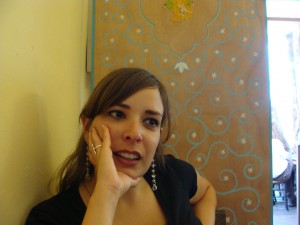
Mondoweiss, January 3, 2010
This is the sixth installation in a seven-part series. See Mondoweiss for details.
When Tania Hary was 15, she found her father’s birth certificate. It read Palestine. “It was a shock,” Hary, now 29, recalls. “I couldn’t assess the full ramifications.”
Though Israeli-born Hary was raised in Los Angeles, she knew about the conflict. When Iraq launched scuds at Israel in 1991, Hary’s grandmother sent the family a picture of herself in a gas mask. During one of the annual family trips to Haifa, the port city Hary left when she was an infant, Palestinians threw rocks at her family’s car. “And I was always aware of soldiers and guns,” Hary recalls.
But summer vacations spent in the north of Israel left Hary with more than violent images—they also gave her a visceral connection to the land. The smell of orange blossoms, she says, is particularly evocative, tugging her back to her childhood.
As an adult, Hary returned to her home country, settling in Tel Aviv to work for a prominent NGO that advocates for Palestinians. Although Hary is also exploring her connection to Israel, “the jury is still out,” she says of Zionism.
Hary feels that, yes, the Jews deserve a homeland, as does any group that wants to band together in a country—including the Palestinians.
“I think the biggest political statement that could be made would be if the Palestinians converted en masse to Judaism,” Hary continues. “They would become Zionists. It would stick Zionism in people’s faces and ask them ‘What is this really about?’”
Hary feels that the meaning of Zionism has been warped over time. “The mainstream needs to revise its definition,” she remarks. “The founding fathers were more left-wing than most people are today.” She points to Theodor Herzl’s comments about land acquisition and remarks of Meir Dizengoff, Tel Aviv’s first mayor, regarding non-violence and negotiation.
As for the country today, Hary offers a surprising sentiment—let some of the settlers stay in the West Bank.
She explains that she is against solutions to the conflict put forth by politicians like Lieberman, who, in the past, has proposed that Palestine take the Arab-heavy north of Israel in exchange for the areas of the West Bank populated by settlers. She thinks both sides should stay put.
“We will have two bi-national states,” she says. “There are progressive Palestinians who are behind this solution.” Hary is referring to, amongst others, Ahmed Qureia, the former Prime Minister of the Palestinian Authority. In a recent interview with Haaretz, Qureia stated that, in the event of a two-state agreement, residents of the West Bank settlements Ariel and Ma’aleh Adumim would be welcome to stay in an independent Palestine.
Hary comments, “They would become Jewish Palestinians.” Like her father once was.
This series was printed in its entirety in the Fall 2009 print edition of Zeek, Israelology, which was distributed to J-Street conference attendees.